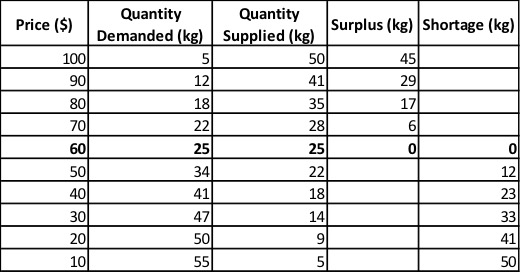Definition: Equilibrium price is the price where the demand for a product or a service is equal to the supply of the product or service. At equilibrium, both consumers and producers are satisfied, thereby keeping the price of the product or the service stable.
What Does Equilibrium Price Mean?
Contents [show]
At EQ, there is no shortage or surplus unless a determinant of demand or a determinant of supply changes. If a change in the price of a good or a service creates a shortage, it means that consumers want to buy a higher quantity than the one offered by producers. In this case, demand exceeds supply and consumers are not satisfied. In contrast, if a change in the price of a product or a service creates a surplus, it means that consumers want to buy less quantity than the one offered by producers. In this case, supply exceeds demand and producers need to lower the price of the product or the service to avoid excessive inventory.
Let’s look at an example.
Example

In the table above, the quantity demanded is equal to the quantity supplied at the price level of $60. Therefore, the price of $60 is the equilibrium price. At any other price level, there is either surplus or shortage. Specifically, for any price that is lower than $60, the quantity supplied is greater than the quantity demanded, thereby creating a surplus. For any price that is higher than $60, the quantity demanded is greater than the quantity supplied, thereby creating a shortage.
The equilibrium price can change in case of a technological advancement or lower production costs that will increase the supply of the product at any price level, thereby lowering the EQ. Similarly, an increase in the production costs will decrease supply at any price level, thereby increasing the EQ.


